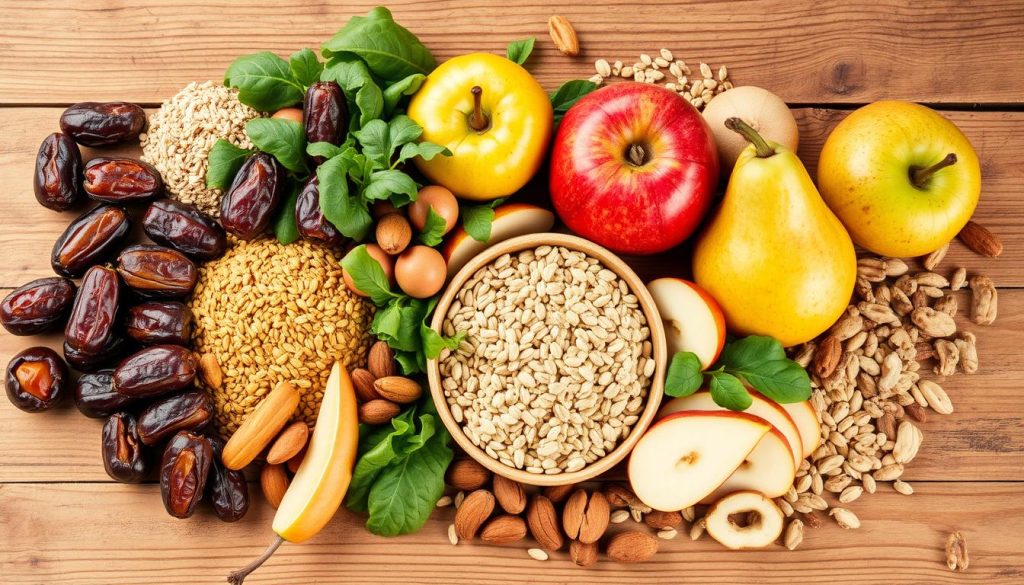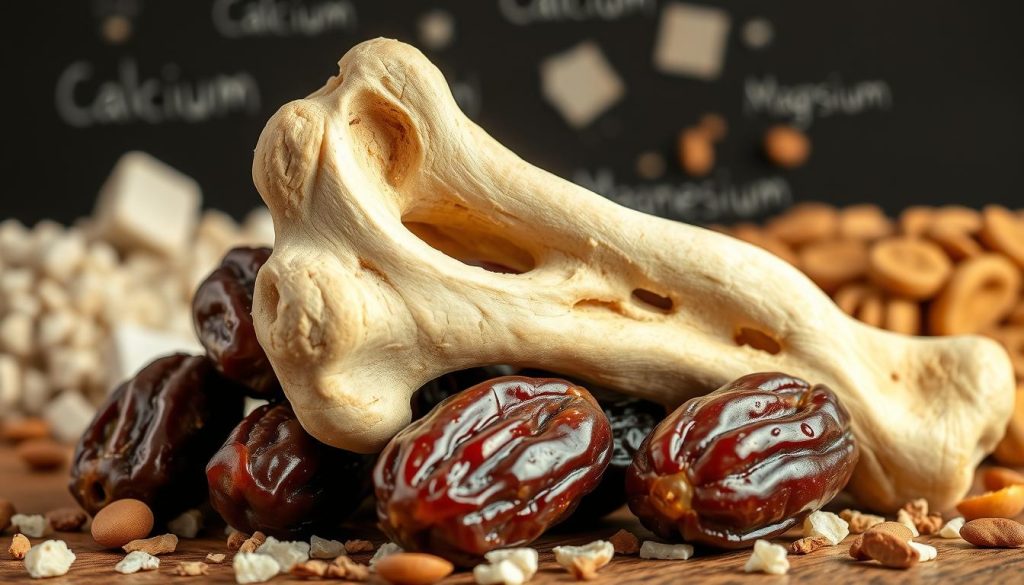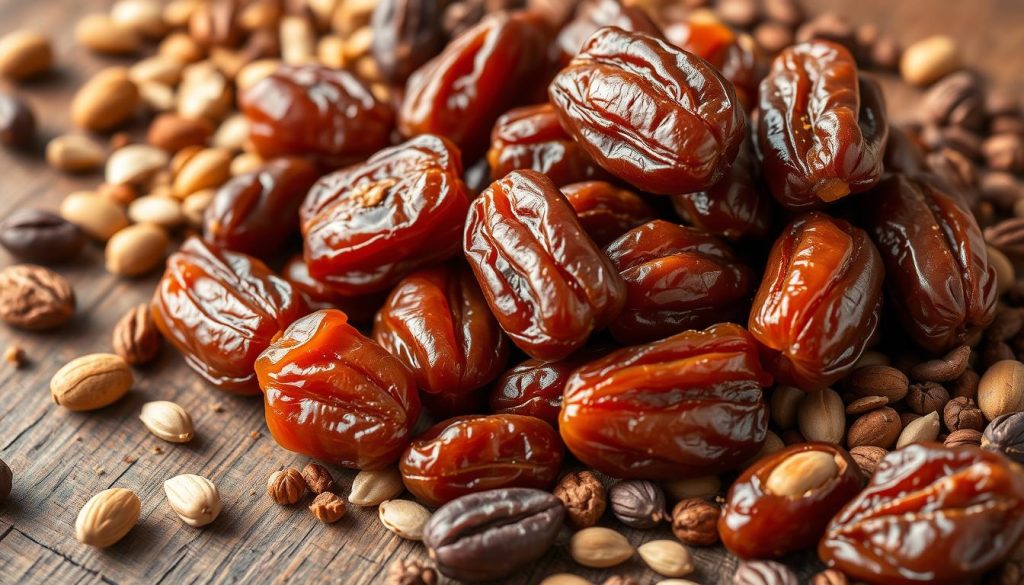I’ve always been curious about the health benefits of dates. They are a tasty fruit from the palm family. A 3.5-ounce serving of Medjool dates has 277 calories, 75 grams of carbs, 7 grams of fiber, and 2 grams of protein. They also have important vitamins and minerals.
Dates are full of potassium, magnesium, manganese, iron, copper, and vitamin B6. They are a top choice for a nutritious dried fruit. Studies show dates have high antioxidant levels, even more than figs and dried plums. This can help lower the risk of heart disease, cancer, Alzheimer’s, and diabetes.
Health experts say eating 4-6 dates a day is best. You can enjoy them whole, blend them into smoothies, add them to salads, or pair them with nut butters. No matter how you eat them, dates offer amazing health benefits.
Key Takeaways
- Dates are packed with essential nutrients, including potassium, magnesium, copper, and vitamin B6.
- Dates contain high levels of antioxidants that may help prevent chronic diseases like heart disease, cancer, and Alzheimer’s.
- Consuming 4-6 dates per day is recommended for optimal health benefits.
- Dates can be enjoyed in a variety of ways, from eating them whole to incorporating them into smoothies and recipes.
- Dates are a natural sweetener and a healthy alternative to processed sugar.
Understanding Dates: Nature’s Sweet Superfood
Dates are a sweet treat from the date palm tree. They come from tropical places around the world. These fruits are packed with vitamins, minerals, and fiber, making them great for a healthy diet.
Types of Dates and Their Characteristics
Dates come in many varieties, each with its own look and taste. Medjool dates are big and juicy, while Deglet Noor dates are smaller and firmer. Fresh dates are rare in the West but are smaller and colorful. Dried dates are chewy and have a caramel-like look.
Nutritional Profile of Dates
Dates are a nutritious dried fruit with a great nutritional profile. A 100-gram serving of dates gives you a lot of copper, magnesium, manganese, potassium, and vitamin B6. This makes them a great choice for your health.
Dates are also fiber-rich food, with about 7 grams of fiber per serving. This is as much as a cup of cooked whole wheat pasta or half a cup of lentils. This fiber helps your heart, keeps blood sugar stable, and lowers the risk of chronic diseases.
How to Select and Store Dates
Choose plump, soft dates with a rich color. Avoid shriveled or hard ones. Store them in an airtight container in the fridge for months. Enjoying two or three Medjool dates a day is a good serving size.
Dates are a superfood that’s both tasty and healthy. They’re great as a snack, in recipes, or as a natural sweetener. They’re essential for anyone who cares about their health.
Top 10 Health Benefits of Dates
Dates are a superfood, packed with nutrients that boost our health. They are full of antioxidants, offering many health benefits. Here are the top 10 reasons to add dates to your diet.
- Boosting Energy Levels: Dates have natural sugars that give you energy all day.
- Strengthening Bones: They are rich in minerals like phosphorus, magnesium, and copper, key for strong bones.
- Promoting Heart Health: Potassium in dates helps control blood pressure. Their fiber can also lower cholesterol and heart disease risk.
- Reducing Inflammation: Dates have antioxidants like flavonoids and phenolic acid, which fight inflammation.
- Improving Sleep Quality: Dates contain melatonin, helping you sleep better.
- Offsetting Anemia: Dates are a good iron source, great for those with anemia.
- Encouraging Healthy Weight Gain: Dates are calorie-dense, helping those who need to gain weight healthily.
- Inducing Calm: Magnesium in dates relaxes the body and mind, promoting calmness.
- Satisfying Sweet Cravings: Dates’ natural sweetness can satisfy sugar cravings without processed sweets.
- Lowering Cholesterol: Their soluble fiber can lower bad cholesterol, improving heart health.
Adding dates to your diet can bring many health benefits. Enjoy them as a snack, in baking, or in recipes for their nutritional value.
“Dates are a nutritional powerhouse, offering a wealth of essential vitamins, minerals, and antioxidants that can support various aspects of our health.”
Dates are great for boosting energy, heart health, or satisfying sweet cravings. Knowing their health benefits helps you make better choices for your well-being.
Dates as Natural Energy Boosters
Dates are more than just a tasty fruit – they’re a natural energy powerhouse. They’re packed with potassium and natural sugar, making them a great fuel for your body and mind. They’re perfect for athletes or anyone looking for a healthy sugar substitute.
Pre and Post Workout Benefits
Dates are a game-changer for active people. They’re full of nutrients that fuel workouts and help muscles recover. Eating a few dates before working out gives you a quick energy boost. Afterward, they help refill energy stores and aid in muscle repair.
Natural Alternative to Processed Sugar
In a world full of artificial sweeteners and refined sugars, dates are a refreshing change. They have a low glycemic index, meaning they release energy slowly. This avoids the blood sugar spikes and crashes that come with processed sugars.
Impact on Athletic Performance
Endurance athletes and fitness lovers can benefit from dates. Their natural sugars, fiber, and nutrients boost athletic performance and recovery. Studies show that eating dates regularly can improve exercise capacity and reduce muscle fatigue.
Looking to fuel your workouts, satisfy sweet cravings, or boost your energy naturally? Dates are a must-have for a healthy lifestyle.
“Dates are a natural energy powerhouse, providing a steady stream of fuel to power your body and mind.”
Digestive Health and Fiber Content
Dates are packed with fiber, which is great for your digestive health. They have almost 7 grams of fiber per 3.5-ounce serving. This can help prevent constipation and keep your bowel movements regular.
A study showed that eating 7 dates a day for 21 days improved stool frequency. It also increased the number of bowel movements.
The fiber in dates also helps control blood sugar levels. It slows down digestion, which means dates have a low glycemic index. This makes them a good choice for keeping blood sugar levels healthy.
| Nutrient | Amount per 100g |
|---|---|
| Calories | 314 kcal |
| Protein | 2.14 g |
| Fat | 0.38 g |
| Carbohydrates | 80.6 g |
| Fiber | 6.7 g |
| Sugar | 66 g |
Dates are not just high in fiber. They also help your gut health. The fiber in them promotes good bacteria in your intestines. It also gets rid of bad bacteria.
This probiotic effect can make your digestive system healthier. It can also improve your overall well-being.
“Dates are a fantastic natural source of fiber, which is essential for maintaining a healthy digestive system and promoting regular bowel movements.”
If you want to aid digestion, manage blood sugar, or boost gut health, dates are a tasty choice. They can be a delicious and nutritious part of your diet.

Brain Health and Cognitive Function
Dates are a sweet treat that’s good for our brains. They have lots of antioxidants, especially flavonoids. These help protect our brains from damage caused by stress and inflammation.
Antioxidant Properties for Neural Protection
Studies show dates can lower brain inflammation. This is good news for fighting diseases like Alzheimer’s. They also might help reduce harmful proteins in the brain linked to Alzheimer’s.
Prevention of Neurodegenerative Diseases
Eating dates regularly can help keep our brains healthy as we age. In Oman, for example, local dates are full of antioxidants. These help protect brain cells from harm.
Studies also found that dates can reduce brain inflammation and harmful proteins in older mice. This suggests they might help fight Alzheimer’s disease.
Dates are packed with antioxidants. These fight brain inflammation and stress. This helps keep our brains healthy and sharp.
“Dates are a remarkable source of natural antioxidants that can protect the brain and enhance cognitive abilities, making them a valuable addition to a healthy diet.”
Heart Health and Blood Pressure Regulation
Dates are great for your heart. They are full of potassium, a key mineral for a healthy heart. Potassium balances out sodium, easing the load on your heart.
Dates also have magnesium, which fights inflammation. Eating foods high in magnesium can lower heart disease risk. Adding dates to your meals protects your heart.
The fiber in dates can also lower cholesterol. This helps keep your heart healthy. Fiber removes cholesterol from your body, preventing artery blockages.
- Dates are a rich source of potassium, which helps regulate blood pressure.
- Magnesium in dates has anti-inflammatory properties that may reduce the risk of cardiovascular diseases.
- The fiber in dates can help lower cholesterol levels, promoting heart health.
Dates are good for both heart health and blood sugar control. Make them a part of your diet. Enjoy their sweetness for a healthier heart and body.
Dates for Pregnancy and Natural Labor
Dates are a nutritious dried fruit that benefits pregnant women, especially in the late stages. Eating dates may help with cervical dilation and reduce the need for induced labor. Studies show that pregnant women who ate dates had shorter labors and were less likely to need induced labor.
Benefits During Late-Term Pregnancy
One study found that women who ate 70-76 grams of dates daily from the 37th week had shorter labors. The labor-promoting effects of dates come from compounds that help with contractions.
Impact on Labor Duration
A recent study with 154 women found that those who ate dates later in pregnancy needed less medical help. It suggests that dates can naturally start labor without medical help.
Dates are a natural energy booster and a nutritious dried fruit with many health benefits during pregnancy. They are rich in natural sugars, fiber, and vitamins, making them great for expectant mothers.
“Eating dates during pregnancy can result in 43% lower rates of cesarean section and 51% lower rates of vacuum/forceps use.”
In conclusion, adding dates to a pregnant woman’s diet, especially in the late stages, can help with labor and delivery. It may reduce the need for medical interventions and lead to a more natural birth experience.
Bone Health and Mineral Content
Dates are great for keeping your bones strong. They are full of minerals like phosphorus, calcium, and magnesium. These are key for healthy bones.
A 3.5-ounce serving of Medjool dates gives you 15% of the daily potassium, 13% magnesium, and 13% manganese. These minerals are important for bone growth and strength. Dates also have copper, which helps make collagen, a bone structure.
Also, dates have selenium, which helps keep bones healthy and prevents osteoporosis. With their rich mineral content, dates are good for bone health. They are especially helpful for those at risk of bone problems.
More studies are needed to know how much dates help with bone health. But, their natural mineral content makes them a great choice for supporting bone health through diet.
| Nutrient | Amount in 3.5 oz (100g) of Medjool Dates | Percentage of Daily Value |
|---|---|---|
| Potassium | 696mg | 15% |
| Magnesium | 54mg | 13% |
| Manganese | 0.3mg | 13% |
| Copper | 0.3mg | 40% |
| Selenium | 0.5mcg | 1% |

“Dates are a rich source of minerals essential for maintaining strong, healthy bones, making them a valuable addition to a bone-supporting diet.”
Blood Sugar Control and Diabetes Management
Despite their sweet taste, dates have a low glycemic index (GI). This means they don’t raise blood sugar levels quickly. The fiber-rich nature of dates helps slow down digestion. This prevents blood sugar spikes after eating.
Dates are good for blood sugar control and diabetes management. They have lots of antioxidants, which help regulate blood glucose. But, because they are high in calories, it’s important to eat them in moderation.
Glycemic Index of Dates
Research shows that different types of dates have a low to medium glycemic index. This ranges from 44 to 53. This makes them a good choice for people with diabetes or those who want to regulate blood sugar.
Role in Blood Sugar Regulation
- Studies found that eating dates daily can improve cholesterol levels in people with diabetes.
- Research showed that dates can lower Fasting Plasma Glucose (FPG) and Postprandial Plasma Glucose (PPPG) levels in diabetes patients.
- But, the studies found no effect on HbA1c, a measure of long-term blood sugar control.
Dates may help with regulating blood sugar and managing diabetes. But, more research is needed to fully understand their benefits.
Conclusion
Dates are a superfood, packed with health benefits. They are rich in vitamins, minerals, fiber, and antioxidants. These nutrients support energy, digestion, brain function, and heart health.
Dates are great for athletes and pregnant women. They offer natural energy and help manage blood sugar. Plus, they’re a healthier choice than processed sweets.
Adding dates to your diet can boost your health. They have a low glycemic index and lots of fiber. This makes them a great choice for a healthy lifestyle.
Try dates for better health. They are full of nutrients and have many benefits. Dates are truly nature’s sweet superfood.


